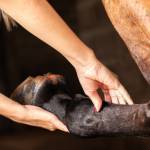Exploring Bone Marrow Macrophages for Equine Osteoarthritis

Bone marrow contains more than stem cells as potential therapeutic biological products for arthritic horses. A recent study shows that macrophage progenitor cells, a type of white blood cells isolated from bone marrow, can improve lameness and joint inflammation in horses diagnosed with osteoarthritis.*
Despite being a leading cause of lameness and poor performance in horses, osteoarthritis has no cure. Available treatments such as corticosteroid anti-inflammatory medications have limitations, offering only temporary relief. Even stem cells and other biologic therapies that demonstrate pro-regenerative effects have inconsistent results. Thus, alternatives are desperately sought.
“Bone marrow contains mononuclear cells (BMNCs) that produce macrophage progenitor cells, precursors to macrophages. These cells reportedly support tissue repair and play an important and active role in promoting resolution of inflammation,” explained Catherine Whitehouse, M.S., a nutrition advisor for Kentucky Equine Research.
Inflammation is a key feature of osteoarthritis, and synovial membrane inflammation (the inner lining of the joint) drives the clinical signs of disease: heat, pain, swelling, and lameness.
To determine if BMNCs isolated from bone marrow taken from the sternum could improve osteoarthritis, 19 client-owned horses diagnosed with OA in a single joint were recruited. All horses received an intra-articular (directly into the joint) injection of freshly prepared BMNCs, saline as a negative control, or triamcinolone, a corticosteroid anti-inflammatory medication. Lameness, joint circumference, and synovial fluid analyses were performed at baseline immediately before treatment and again seven and 21 days after treatment.
Horses treated with intra-articular BMNCs had significantly decreased lameness and joint circumference. Those improvements were primarily observed between days 7 and 21 of the study.
“BMNC was the only treatment resulting in significantly reduced joint circumference, a measure of soft tissue swelling and synovial fluid effusion, and therefore an indirect measure of inflammation,” wrote the researchers.
Analyses of the synovial fluid did not yield particularly valuable information. Pro-inflammatory mediators such as interleukin (IL)-6 and IL-1beta were identified in a limited number of samples. Similarly, anti-inflammatory mediators prostaglandin E2 and IL-10 were inconsistently identified.
Other information gathered from this study included:
- No adverse effects were noted after administering BMNCs;
- This is a point-of-care procedure that requires minimal processing;
- The product is autologous (obtained from the patient); and
- The benefits of this therapy may last 12 months following injection.
Additional research in this field is warranted because, as stated by the researchers, “There is a critical need for therapies that halt disease progression and resolve synovial inflammation while maintaining the homeostasis and reparative functions of the joint.”
“Oral joint supplements can be used to complement veterinary treatments for managing osteoarthritis in horses. Kentucky Equine Research offers several products that offer anti-inflammatory properties that can be used proactively to support joint health in performance horses,” explained Whitehouse.
ReSolvin EQ contains the polyunsaturated fatty acids eicosapentaenoic acid (EPA), docosahexaenoic acid (DHA), and gamma-linolenic acid (GLA). Omega-3 fatty acids, such as EPA and DHA, are often fed to support joint health as they have anti-inflammatory properties. This supplement also aids in preventing or resolving severe squamous gastric ulceration, which could develop when using nonsteroidal anti-inflammatory drugs widely used in arthritic horses.
*Everett, J.B., B.C. Menarim, S.H. Barrett, S.H. Bogers, C.R. Byron, R.S. Pleasant, S.R. Were, and L.A. Dahlgren. 2023. Intra-articular bone marrow mononuclear cell therapy improves lameness from naturally occurring equine osteoarthritis. Frontiers in Veterinary Science 10:1256284.








